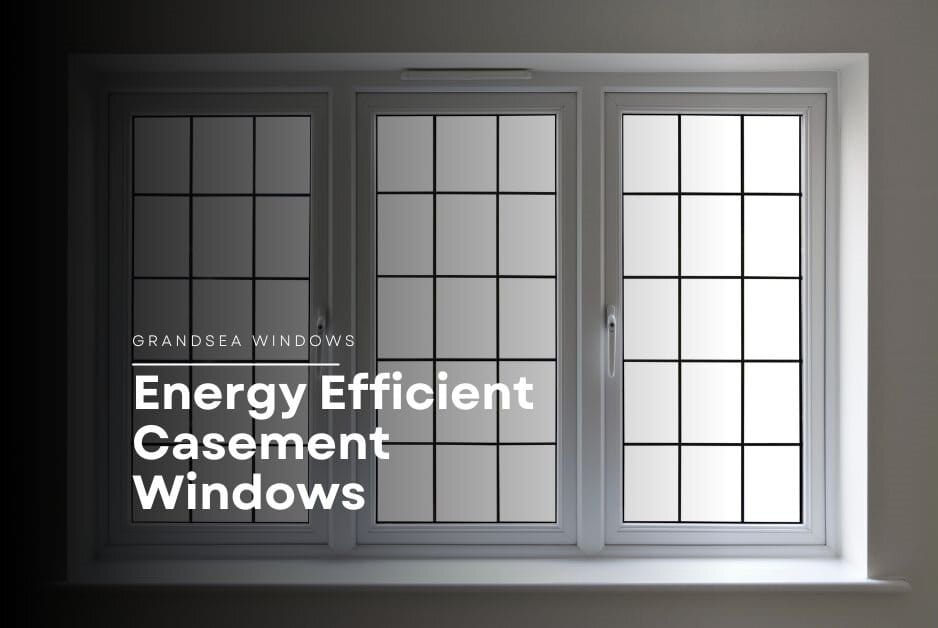Currently, as energy prices continue to rise, homeowners are seeking ways to reduce their energy costs. One effective solution is the installation of energy-efficient casement windows. These windows not only enhance the appearance of your home but also offer significant energy savings. In this post, we will explore how casement windows improve energy efficiency, the features of energy-efficient frames, and tips for selecting the best options for your home
How Casement Windows Improve Energy Efficiency
Casement windows are hinged on the sides and open outward, typically operated by a crank. This design offers several energy-efficiency benefits:
Tight Seal: Casement windows create a strong seal that minimizes air leakage. Unlike sliding or double-hung windows, which may have gaps that allow air to escape, casement windows press firmly against the frame when closed.
Better Ventilation: The design of casement windows allows for maximum airflow. When opened, they catch breezes from outside and direct them into your home, promoting natural ventilation. This can reduce the need for air conditioning, especially in milder weather.
Advanced Insulation: Many modern casement windows feature the latest insulation technologies, including double or triple glazing, low-emissivity (Low-E) coatings, and insulating gas fills between the panes. These features reduce heat transfer, keeping your home warmer in winter and cooler in summer.
Features of Energy-Efficient Casement Windows
When choosing energy-efficient casement windows, consider the following key features:
Triple or Double Glazing: Multiple layers of glass with insulating gas fillers (such as argon or krypton) between them significantly improve insulation. Triple glazing offers even more protection than double glazing but typically comes at a higher cost.
Low-Emissivity (Low-E) Coatings: These invisible, micro-thin metallic coatings are applied to the glass to reflect infrared light. They help keep heat inside during the winter and outside during the summer, which stabilizes your home’s temperature and reduces energy use.
Frame Material: The window frame material also impacts energy efficiency. Fiberglass, vinyl, and wood are all popular choices. Fiberglass and vinyl offer excellent insulation and are low-maintenance, while wood provides natural insulation and a traditional aesthetic.
Energy Star Certification: Look for windows with the Energy Star label. This indicates that the windows meet strict energy efficiency standards set by the U.S. Environmental Protection Agency (EPA). Energy Star-certified windows can save homeowners around 12% on energy bills compared to non-certified windows.
Tips for Choosing Energy-Efficient Casement Windows
The right energy efficient casement Windows for your house requires more than choosing the most expensive one. Below are some suggestions to assist you in making an informed choice:
Consider Your Climate: The ideal energy-efficiency features depend on your local climate. In colder regions, prioritize windows with superior insulation, such as triple glazing and Low-E coatings. In warmer climates, focus on windows with high-quality UV protection to minimize solar heat gain.
Evaluate U-Factor and SHGC: The U-factor measures how well a window insulates, while the Solar Heat Gain Coefficient (SHGC) measures how much solar heat it lets through. Lower numbers are better for both. Aim for windows with a U-factor of 0.30 or less and an SHGC of 0.25 or less for optimal performance.
Ensure Proper Installation: Even the best windows will underperform if installed incorrectly. Ensure your windows are installed by a trained professional who follows best practices for sealing and insulation to prevent air leaks and efficiency loss.
Review Warranty and Maintenance: Energy-efficient windows are a significant investment, so protect it. Choose products that come with a strong warranty and are easy to maintain. Regular cleaning and inspection will keep your windows performing efficiently for years.
Conclusion
The investment of energy efficient Casement Windows is an effective option to lower your electricity costs and increase the comfort of your house. They are sealed to ensure better ventilation and the latest design features for insulation, the casement windows come with a myriad of benefits of using casement windows which makes ideal for those who want to be energy efficient. If you take into consideration factors such as the glass, coatings that are low-E, as well as the proper way to install them to select the right windows for your requirements and reap their long-term benefits. Avoid letting high costs for energy burden you. Install energy-efficient casement windows now and begin cutting down on expenses for energy.



